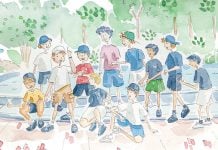Good books expose us to ideas that have dimension. Great writers pierce our consciousness in ways that compel, delight, and unsettle us. In short, they make us think rather than telling us what to think, inviting us to enlarge and deepen our understanding of reality. That reality includes oneself.
Here, Dr Felicity McCutcheon, Head of Teacher Development in the Senior School, identifies five books and their ideas that have contributed in a significant way to her maturation as a philosopher and teacher which others may also care to explore.
C S Lewis, Till We Have Faces
Idea: To truly love we must be willing to face and overcome self-deception.
Quote: “Holy places are dark places. It is life and strength, not knowledge and words, that we get in them. Holy wisdom is not clear and thin like water, but thick and dark like blood.”
Parker J Palmer, The Courage to Teach
Idea: Teaching is not merely the ‘what’ and the ‘how’ but the ‘who’. Who is it who teaches?
Quote: “Teaching, like any truly human activity, emerges from one’s inwardness, for better or worse. As I teach, I project the condition of my soul onto my students, my subject, and our way of being together…. When I do not know myself, I cannot know who my students are. I will see them through a glass darkly, in the shadows of my unexamined life – and when I cannot see them clearly, I cannot teach them well. When I do not know myself, I cannot know my subject – not at the deepest levels of embodied, personal meaning. I will know it only abstractly, from a distance, a congeries of concepts as far removed from the world as I am from personal truth.”
Neil Postman, Amusing Ourselves to Death
Idea: All technology both gives and takes away. We are often so preoccupied with what it has made possible that we fail to examine what it has removed or undone that might be important to us.
Quote: “We were keeping our eye on 1984. When the year came and the prophecy didn’t, thoughtful Americans sang softly in praise of themselves. The roots of liberal democracy had held. Wherever else the terror had happened, we, at least, had not been visited by Orwellian nightmares.
But we had forgotten that alongside Orwell’s dark vision, there was another—slightly older, slightly less well known, equally chilling: Aldous Huxley’s Brave New World. Contrary to common belief even among the educated, Huxley and Orwell did not prophesy the same thing. Orwell warns that we will be overcome by an externally imposed oppression. But in Huxley’s vision, no Big Brother is required to deprive people of their autonomy, maturity and history. As he saw it, people will come to love their oppression, to adore the technologies that undo their capacities to think.”
John O’Donohue, Eternal Echoes
Idea: The human heart is full of longing yet needs a shelter of belonging if it is to open up fully to the adventure of living joyfully, powerfully and tenderly.
“When you are touched by love, it reaches down into your deepest fibre. You inhabit your life, you seem to be in control. You live within an independent physical body. From the outside, you seem to be managing very well. Because you present this face to the world, no-one suspects that you have a different ‘inner body’ called the heart which can do nothing for itself if it is not loved… If our hearts were outside our bodies, we would see crippled bodies transformed into ballet dancers under the gaze, and in the embrace, of love. When you are loved, your heart rushes forth in the joy of the dance of life. When you are discovered, you then discover yourself.”
John Ralston Saul, The Unconscious Civilisation
Idea: Knowledge has not necessarily made us more conscious but instead led to the creation of specialised language with a self-justifying logic, cut off from the organic and concrete reality of human life. Where process and structure dominate, the result is not an educated and thoughtful citizenry, but one that is increasingly conformist and corporate.
Quote: “The examined life makes a virtue of uncertainty…the virtue of uncertainty is not a comfortable idea…the acceptance of psychic discomfort is the acceptance of consciousness…To live in delusion is to live in the comfort of ideology.”
Beyond those authors listed here, Felicity says that Ludwig Wittgenstein and Soren Kierkegaard were also richly formative: “Their writing, along with that of Friedrich Nietzsche (a scintillating agent provocateur), continues to engage my intellect, imagination and spirit in complex and ongoing ways.”



